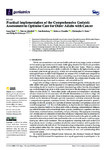Practical Implementation of the Comprehensive Geriatric Assessment to Optimise Care for Older Adults with Cancer
| dc.contributor.author | Schofield, P | |
| dc.contributor.author | Debruyne, P | |
| dc.date.accessioned | 2023-01-23T11:53:59Z | |
| dc.date.issued | 2023-01-23 | |
| dc.identifier.issn | 1936-5764 | |
| dc.identifier.issn | 2308-3417 | |
| dc.identifier.other | 18 | |
| dc.identifier.uri | http://hdl.handle.net/10026.1/20192 | |
| dc.description.abstract |
Whilst cancer remains a very serious health problem at any stage, cancer combined with increasing age creates an even more challenging situation for health care providers. Age is the principal non-modifiable risk factor for all cancer types. There is a rising incidence of cancer among older adults worldwide. In Belgium, the highest incidence rate is situated in the 80–84 age group [1]. In 2020, 60% of women and 70% of men in Belgium were aged 65 years or older when diagnosed, an increase of 6% for both sexes compared to 2010 [1]. Older adults with cancer can be a vulnerable group of individuals, as they present with unique characteristics that have naturally developed as a consequence of aging, such as altered physiology, functional impairment, and comorbidities [2]. In geriatric oncology, there is an awareness of the heterogeneity of the population of older adults with cancer and the spectrum of impairments that may be experienced. Decision making should be based on the patient’s functional age rather than the chronological age, as chronological age alone is often a poor indicator of the physiological and functional status of older adults [3]. Some older adults will present as independent individuals, whereas others may be at a moderate risk of health deterioration or even have a high risk of functional decline or mortality. These different profiles, ranging from fit over vulnerable to frail, can be determined through a geriatric assessment, and more extensively through a comprehensive geriatric assessment (CGA). The CGA is the gold standard in geriatric oncology to identify patients at a high risk of adverse outcomes and optimize cancer and overall management [4,5]. This multidisciplinary, in-depth evaluation helps physicians to assess the objective health of the older adult while evaluating vulnerabilities in different age-related domains such as functional status, physical performance, cognition, nutrition, social status, emotional status, comorbidity, and polypharmacy. The appropriate screening and identification of vulnerable or frail older adults is an important step to administer a safe and effective cancer treatment. Evidence-based data based on the geriatric profile are essential to determine potential risks and benefits older adults with cancer could encounter during and after cancer treatment. The use of geriatric screening tools such as the CGA helps physicians to develop a coordinated plan for cancer treatment and to guide interventions tailored to the individual. The integration of general geriatric principles focusing on the patient rather than the tumour represents the first step towards individualized treatment decisions, and consequently, the avoidance of over- and undertreating older adults with cancer. In a recent report on Clinical Cancer Advances, the American Society of Clinical Oncology (ASCO) stressed the importance of an equal opportunity to participate in, be recognized for, and benefit from research for all populations [6]. Amongst others, the optimisation of care for older adults with cancer was mentioned as one of the research priorities in order to accelerate progress against cancer, with the following focus areas: (1) the use of practice-based data to better understand the efficacy and toxicities of cancer treatments; (2) the development of standardized methods to characterize physiologic aging, such as geriatric assessment; and (3) testing the role of geriatric assessment-guided management in improving outcomes using personalized care, in order to minimise the undertreatment of fit patients and the overtreatment of vulnerable or frail patients. | |
| dc.format.extent | 18-18 | |
| dc.format.medium | Electronic | |
| dc.language | en | |
| dc.language.iso | en | |
| dc.publisher | Advanstar Communications Inc. | |
| dc.subject | 4203 Health Services and Systems | |
| dc.subject | 4205 Nursing | |
| dc.subject | 42 Health Sciences | |
| dc.subject | Generic health relevance | |
| dc.subject | Cancer | |
| dc.subject | 3 Good Health and Well Being | |
| dc.title | Practical Implementation of the Comprehensive Geriatric Assessment to Optimise Care for Older Adults with Cancer | |
| dc.type | journal-article | |
| dc.type | Editorial Material | |
| plymouth.author-url | https://www.ncbi.nlm.nih.gov/pubmed/36826360 | |
| plymouth.issue | 1 | |
| plymouth.volume | 8 | |
| plymouth.publication-status | Published online | |
| plymouth.journal | Geriatrics | |
| dc.identifier.doi | 10.3390/geriatrics8010018 | |
| plymouth.organisational-group | /Plymouth | |
| plymouth.organisational-group | /Plymouth/Faculty of Health | |
| plymouth.organisational-group | /Plymouth/Faculty of Health/School of Nursing and Midwifery | |
| plymouth.organisational-group | /Plymouth/Research Groups | |
| plymouth.organisational-group | /Plymouth/Research Groups/Plymouth Institute of Health and Care Research (PIHR) | |
| plymouth.organisational-group | /Plymouth/Users by role | |
| plymouth.organisational-group | /Plymouth/Users by role/Academics | |
| dc.publisher.place | Switzerland | |
| dcterms.dateAccepted | 2023-01-18 | |
| dc.rights.embargodate | 2023-1-25 | |
| dc.identifier.eissn | 2308-3417 | |
| rioxxterms.versionofrecord | 10.3390/geriatrics8010018 | |
| rioxxterms.licenseref.uri | http://www.rioxx.net/licenses/all-rights-reserved | |
| rioxxterms.type | Journal Article/Review |


